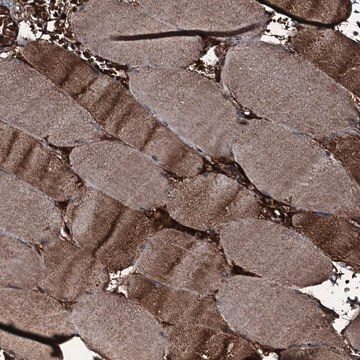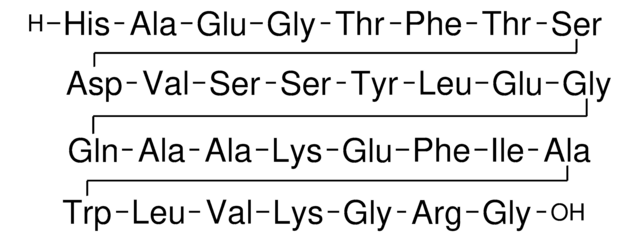G8166
Glucagon-Like Peptide 2 -Arg human trifluoroacetate salt
>90% (HPLC), solid
Synonym(s):
GLP-2-Arg, Preproglucagon 126-159
Sign Into View Organizational & Contract Pricing
All Photos(1)
About This Item
Empirical Formula (Hill Notation):
C171H266N48O56S
CAS Number:
Molecular Weight:
3922.29
MDL number:
UNSPSC Code:
51111800
NACRES:
NA.32
Recommended Products
Amino Acid Sequence
His-Ala-Asp-Gly-Ser-Phe-Ser-Asp-Glu-Met-Asn-Thr-Ile-Leu-Asp-Asn-Leu-Ala-Ala-Arg-Asp-Phe-Ile-Asn-Trp-Leu-Ile-Gln-Thr-Lys-Ile-Thr-Asp-Arg
General description
Glucagon-like peptide 2 (GLP-2) is a member of the pro-glucagon gene family which is released in small and large intestinal circulation by enteroendocrine L cells. This peptide is composed of 33 amino acids.
Application
Glucagon-Like Peptide 2 (GLP-2) -Arg human trifluoroacetate salt has been used for injection in chickens to determine the effects of GLP-2 on the weight and morphology of small intestines.
Biochem/physiol Actions
Glucagon-like peptide 2 (GLP-2) influences the functionality of gastrointestinal tract by participating in the feedback loop to the brain for the control of food intake. It also controls digestion and absorption, and has tropic effects post chemotherapy injury or surgical resection. This peptide is also responsible for epithelial cell proliferation of the small bowel. Studies in rats show that this peptide enhances the effects of the ileal-brake hormones, GLP-1 and peptide YY. It also negatively regulates gastrointestinal motility and secretion. Thus, it has potential as a therapeutic agent in short-bowel syndrome.
Glucagon-like peptide 2 is a neuropeptide that inhibits food intake when injected into the lateral ventricles of the brain and may mediate satiety. It is also a growth factor that stimulates proliferation and blocks apoptosis of intestinal epithelial cells.
Storage Class
11 - Combustible Solids
wgk_germany
WGK 3
flash_point_f
Not applicable
flash_point_c
Not applicable
ppe
Eyeshields, Gloves, type N95 (US)
Choose from one of the most recent versions:
Already Own This Product?
Find documentation for the products that you have recently purchased in the Document Library.
D J Drucker et al.
Proceedings of the National Academy of Sciences of the United States of America, 93(15), 7911-7916 (1996-07-23)
Injury, inflammation, or resection of the small intestine results in severe compromise of intestinal function. Nevertheless, therapeutic strategies for enhancing growth and repair of the intestinal mucosal epithelium are currently not available. We demonstrate that nude mice bearing subcutaneous proglucagon-producing
X F Hu et al.
Poultry science, 89(9), 1967-1974 (2010-08-17)
An experiment was conducted to determine the effect of injecting glucagon-like peptide 2 (GLP-2) on the small intestinal weight, morphology, and nutrient transporter expression in pharmacologically stressed broiler chickens. A total of 144 seven-day-old birds were fed either a basal
P B Jeppesen et al.
Gastroenterology, 120(4), 806-815 (2001-03-07)
Glucagon-like peptide 2 (GLP-2) is intestinotrophic, antisecretory, and transit-modulating in rodents, and it is mainly secreted from the intestinal mucosa of the terminal ileum and colon after food ingestion. We assessed the effect of GLP-2 on the gastrointestinal function in
Our team of scientists has experience in all areas of research including Life Science, Material Science, Chemical Synthesis, Chromatography, Analytical and many others.
Contact Technical Service








